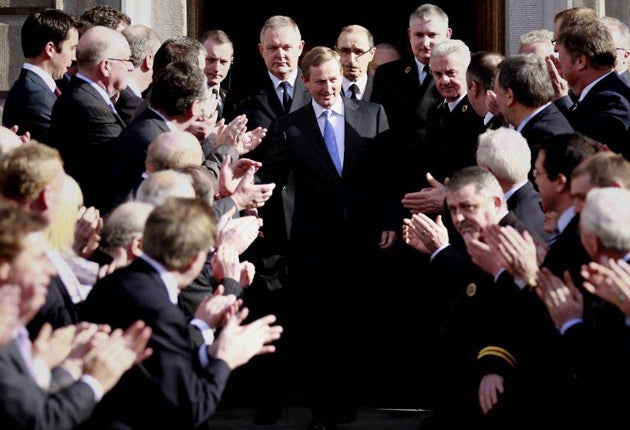Ireland's new leader warns debt crisis is nation's 'darkest hour'

Your support helps us to tell the story
From reproductive rights to climate change to Big Tech, The Independent is on the ground when the story is developing. Whether it's investigating the financials of Elon Musk's pro-Trump PAC or producing our latest documentary, 'The A Word', which shines a light on the American women fighting for reproductive rights, we know how important it is to parse out the facts from the messaging.
At such a critical moment in US history, we need reporters on the ground. Your donation allows us to keep sending journalists to speak to both sides of the story.
The Independent is trusted by Americans across the entire political spectrum. And unlike many other quality news outlets, we choose not to lock Americans out of our reporting and analysis with paywalls. We believe quality journalism should be available to everyone, paid for by those who can afford it.
Your support makes all the difference.Veteran Irish politician Enda Kenny yesterday assumed both the mantle of Prime Minister and primary responsibility for his country's mountainous set of economic problems.
On a day when the mood in Irish politics was a mixture of the celebratory and the sombre, he was elected Taoiseach at the head of a government combining his conservative Fine Gael party with the leftist Irish Labour party.
In his acceptance speech he acknowledged the depth of the financial troubles. "I believe this crisis is the darkest hour before the dawn," he said, adding that his government faced, "a task of rescuing our economy, of resuscitating our reputation and of restoring our society."
The incoming administration inherits the worst economic situation in independent Ireland's history, after the country was obliged to accept an €85bn bail-out from the EU and IMF last year.
The new government has limited room for movement financially, since the bail-out came with conditions including a detailed programme of austerity and belt-tightening budgets which will mean further deep cuts and increased taxation. During the election campaign Mr Kenny described the bail-out as, "a bad deal for Ireland and a bad deal for Europe", a view to which his new Labour partners also subscribe.
His administration's first major challenge will be to test whether the international financial institutions are prepared to show some flexibility, particularly in terms of timetables and interest rates. Signals coming from Europe have not been negative but nor has it been indicated that substantial concessions will readily be forthcoming.
A spokesman for the European Commission said it welcomed the new government's, "strong commitment to the key economic policy goals, in particular as it concerns the fiscal consolidation path."
Mr Kenny, as part of his lobbying campaign, is to hold important meetings in the next few days. This evening he is to hold a meeting with European Commission president Jose Manuel Barroso in Brussels in advance of a special summit of EU leaders tomorrow.
These crucial meetings are a reminder that, while Ireland's two biggest parties yesterday formed a partnership, there are in effect three elements in the marriage, the parties and the international institutions.
The Fine Gael-Labour deal is grounded in an agreement that they will follow the conditions imposed under the bail-out for two years and then review its progress. The coalition has a huge majority in the Irish parliament, as was reflected when Mr Kenny became Taoiseach by 117 votes to 27. His supporters are so numerous that they will overflow from the traditional government benches.
Opposition to the new government will be made up of three elements, including the rump of the Fianna Fail party which plummeted from more than 70 seats to just 20. Blamed for the depths of the recession in Ireland, it has been reduced to something close to political disgrace.
Independents won 20 other seats while Sinn Fein almost trebled its representation from five to 14. Its leader Gerry Adams appeared in the Dublin parliament for the first time yesterday since shifting his political base from Belfast to the Irish Republic.
Although the Labour party voted overwhelmingly to go into coalition, its leader Eamon Gilmore acknowledged that it will be helping to govern in very tough times. His party would be going to meetings, he warned, "through a forest of placards."
Join our commenting forum
Join thought-provoking conversations, follow other Independent readers and see their replies
Comments